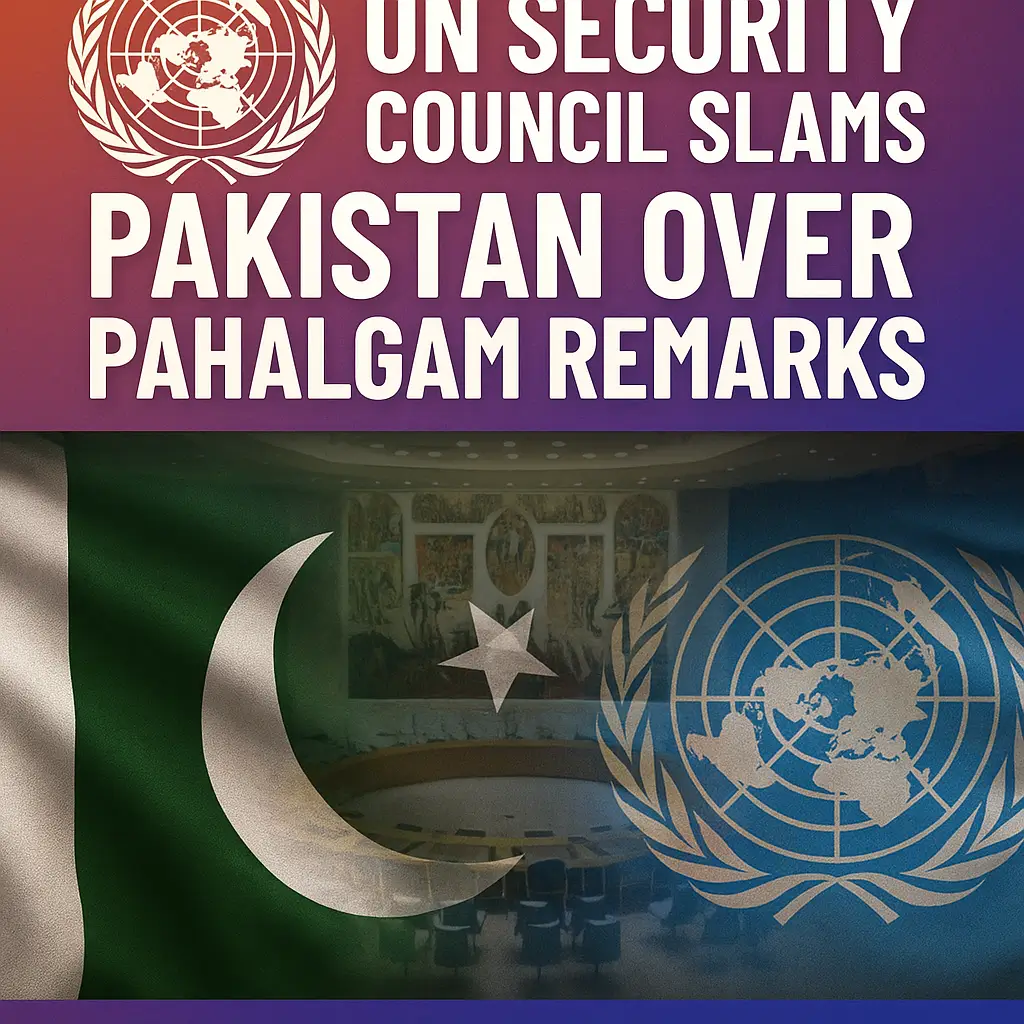New York – The United Nations Security Council (UNSC) has strongly criticized Pakistan over recent remarks made by a senior Pakistani official about the Indian region of Pahalgam. The UNSC described the comments as provocative, politically charged, and undermining the sovereignty of India. This marks the latest development in the ongoing tensions between India and Pakistan, particularly regarding the Kashmir issue.
Pakistan’s Controversial Remarks on Pahalgam
The controversy erupted when Pakistan’s foreign minister, Shah Mehmood Qureshi, made statements about the Kashmir region and specifically referenced Pahalgam, a popular tourist and religious destination in India-administered Jammu and Kashmir. The remarks were seen as an attempt to undermine India’s sovereignty and to further Pakistan’s position on the Kashmir issue, which remains a contentious topic in international diplomacy.
Qureshi’s comments centered around alleging human rights violations and political oppression in Jammu and Kashmir, despite global recognition of the region as part of Indian territory. Pahalgam, which is widely known for its lush green valleys, serene landscapes, and the annual Amarnath Yatra pilgrimage, was specifically mentioned in the context of Pakistan’s ongoing narrative concerning the Kashmir dispute.
UN Security Council’s Reprimand
In response to Pakistan’s remarks, the United Nations Security Council issued a stern statement, condemning the move as a violation of international norms and the UN Charter. A UNSC spokesperson emphasized that Pakistan’s interference in the internal affairs of a sovereign nation was not acceptable. The UNSC’s criticism was a clear indication that the international body stands in support of India’s sovereignty and territorial integrity over Jammu and Kashmir.
The statement from the UNSC read, “The Security Council reiterates its commitment to respecting the territorial integrity of member states and recognizes the importance of refraining from inflammatory statements that could escalate tensions in sensitive regions.”
India’s Response to the UNSC Rebuke
India welcomed the UNSC’s strong stand on the issue, reiterating that Jammu and Kashmir, including Pahalgam, is an integral part of India. Indian officials noted that the region had been a peaceful and prosperous area, far removed from the politicized narrative that Pakistan attempts to portray. India further emphasized that the remarks made by Pakistan were not only incorrect but also contrary to the spirit of cooperation and peace-building in the region.
An official spokesperson from India’s Ministry of External Affairs stated, “The continued attempts by Pakistan to spread misinformation and undermine India’s sovereignty are both uncalled for and counterproductive. The international community must stand united against such provocative rhetoric.”
Global Support for India’s Sovereignty
The UNSC’s reprimand of Pakistan is reflective of the broader international support for India’s position on Kashmir. Several countries and international organizations have long recognized the region as part of India’s territorial integrity, and the UNSC’s response to Pakistan’s remarks aligns with this widespread acknowledgment.
India’s diplomatic efforts have gained traction over the years, with nations across the world reaffirming their support for India’s sovereignty over Jammu and Kashmir. This includes support for India’s right to govern the region and manage its internal affairs without external interference.
Pahalgam’s Significance and Cultural Importance
Pahalgam holds significant cultural and religious importance, particularly for Hindus in India. It is the starting point for the Amarnath Yatra, an annual pilgrimage to the Amarnath Cave, which is dedicated to Lord Shiva. The region’s rich natural beauty, including the Lidder River, lush meadows, and forests, attracts thousands of tourists each year.
Beyond tourism, Pahalgam is also a symbol of harmony, with people of various faiths living and working together peacefully. It is often considered a serene haven amidst the ongoing geopolitical issues in the Kashmir valley. As a result, Pakistan’s attempts to politicize Pahalgam’s significance have been widely condemned, not only in India but also in the international community.
The Diplomatic Implications for Pakistan
The UN Security Council’s strong rebuke marks a critical diplomatic blow to Pakistan, highlighting the international community’s growing frustration with Pakistan’s rhetoric on Kashmir. Pakistan’s use of international forums to press its position on Kashmir has faced growing criticism, especially when its claims are viewed as baseless and contrary to international norms.
The UNSC’s condemnation of Pakistan’s comments serves as a reminder that inflammatory remarks made on sensitive issues like territorial disputes can backfire diplomatically. Analysts suggest that Pakistan will need to reassess its approach and engage in more constructive dialogue rather than continuing to provoke tensions through controversial statements.
What’s Next in the India-Pakistan Diplomatic Relations?
The UNSC’s reprimand comes at a time when both India and Pakistan are at a crossroads in their diplomatic relations. Although bilateral talks have been attempted in the past, the Kashmir issue remains unresolved, and the recent escalation in rhetoric only adds to the complexity of the situation.
The international community, led by the United Nations, has repeatedly called for dialogue between India and Pakistan to resolve their differences in a peaceful and constructive manner. However, Pakistan’s continued politicization of Kashmir in international forums has only made it more challenging for meaningful talks to take place.
As the international community watches closely, it is hoped that both countries will focus on de-escalation and work toward a more stable and peaceful future for the region. The UNSC’s warning to Pakistan serves as a reminder that diplomacy must be conducted with respect for the territorial integrity of sovereign nations and an eye toward peace and cooperation.
Conclusion
The UN Security Council’s strong condemnation of Pakistan’s remarks on Pahalgam signals a critical moment in international diplomacy concerning the Kashmir dispute. With global backing for India’s position, it’s clear that Pakistan’s attempts to challenge India’s sovereignty over Jammu and Kashmir are not gaining traction in the international community. As tensions between the two nuclear-armed neighbors continue, the hope is that both sides will focus on peace-building and refrain from making provocative statements that only serve to further polarize the region.

